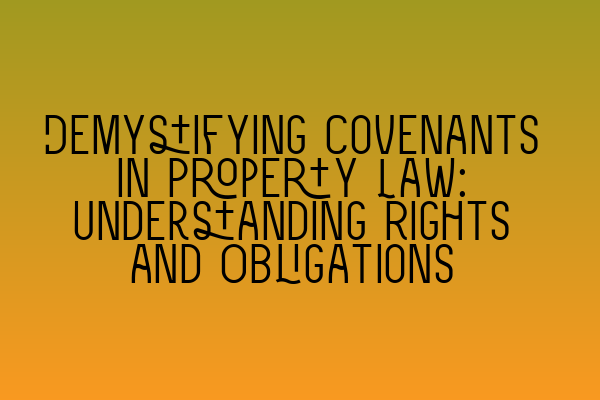Demystifying Covenants in Property Law: Understanding Rights and Obligations
In the realm of property law, covenants play a crucial role in determining the rights and obligations of property owners. However, these legal agreements can often be complex and difficult to understand for those who are not well-versed in property law. In this article, we aim to demystify covenants and provide you with a clear understanding of their importance and implications. Whether you are a property owner, a landlord, or a tenant, understanding covenants is essential to ensure that you are aware of your legal rights and obligations.
What are Covenants?
At its core, a covenant is a legally binding agreement between two or more parties that outlines certain rights and obligations related to the use and enjoyment of a property. These agreements are typically included in property deeds or contracts and can impose restrictions or grant rights to the parties involved. Covenants can cover a wide range of issues, including land use restrictions, maintenance obligations, and financial responsibilities.
There are two types of covenants – positive covenants and negative covenants. Positive covenants require the party bound by the covenant to do something specific, such as maintaining the property or paying service charges. Negative covenants, on the other hand, restrict the activities of the party bound by the covenant, such as prohibiting certain types of alterations to the property or limiting its use to residential purposes only.
Enforceability of Covenants
One important aspect of covenants is their enforceability. In order for a covenant to be legally enforceable, it must meet certain criteria. Firstly, the covenant must be made between two legal entities, such as property owners or landlords and tenants. Secondly, the covenant must touch and concern the land in question, meaning it must directly affect the use and enjoyment of the property. Lastly, the covenant must show an intention to bind successors in title, which means that the covenant will continue to be enforceable even when the property changes hands.
It is important to note that not all covenants are enforceable indefinitely. Some covenants have time limits or expiration dates, while others may be deemed unenforceable due to changes in circumstances or public policy. Therefore, it is crucial to seek legal advice and thoroughly review the terms of any covenant before entering into an agreement.
Implications of Covenants
The implications of covenants can be far-reaching and can significantly impact property owners, landlords, and tenants. For property owners, covenants can dictate how the property can be used, what alterations can be made, and what obligations they have towards the property and its surrounding community.
For landlords, covenants can govern their responsibilities towards the property and its tenants. This can include maintenance duties, service charge collections, and ensuring that tenants comply with the terms of their lease agreements.
Similarly, tenants are bound by covenants that outline their rights and obligations towards the property. This could include restrictions on subletting, requirements for property upkeep, and compliance with noise or nuisance regulations.
It is essential for all parties involved in a covenant to fully understand its implications and abide by its terms. Failure to do so can result in legal disputes, financial penalties, and potential damage to the relationship between property owners, landlords, and tenants.
Seeking Legal Advice
Given the complexity and potential implications of covenants in property law, it is advisable to seek legal advice when dealing with such agreements. A qualified property solicitor can provide you with expert guidance, review the terms of any covenant, and ensure that your rights and obligations are protected.
If you are in need of legal assistance or would like to deepen your knowledge in other areas of contract law, SQE Property Law & Land Law is here to help. We offer a range of services, including case analysis, webinars, and interactive mock tests, all aimed at helping you master the essentials of property law. Take a look at our related articles and join our webinars for expert insights and guidance:
- SQE Contract Law: Analyzing Landmark Cases and Influential Judicial Decisions
- Understanding Contractual Capacity: Rights and Limitations
- Interactive SQE Mock Tests for Contract Law: Test Your Knowledge
- Join Our SQE Contract Law Webinars: Expert Insights and Guidance
- SQE Prep: Mastering the Essentials of Contract Law
At SQE Property Law & Land Law, we are dedicated to providing comprehensive support and resources to help you navigate the intricacies of property law. Contact us today to learn more about our services and how we can assist you in your legal journey.
